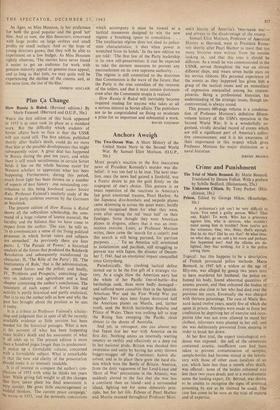Anchors Aweigh
The Two-Ocean War. A Short History of the United States Navy in the Second World War. By Samuel Eliot Morison. (0.U.P., 50s.) Mosr people's reaction to the first inaccurate news of President Kennedy's murder was 'dis- belief: it was too bad to be true. The next reac- tion, once the news had gained a foothold, was a frantic desire to pin the guilt firmly on the scapegoat of one's choice. This pattern is an exact repetition of the reactions to America's last great emotional trauma, Pearl Harbor. As the Japanese dive-bombers and torpedo planes came skimming in across the quiet water, hardly anyone recognised them for what they were, even after seeing the red 'meat ball' on their fuselages. Some thought they were American planes in disguise, others that it was an over- zealous exercise. Later, as Professor Morison writes, there came the 'search for a culprit; and this search is still being pursued, for partisan purposes. . . .' To an America still orientated to isolationism and pacifism, still struggling to prevent war with Japan, the disaster of Decem- ber 7, 1941, had an emotional impact unequalled since Gettysburg.
Paradoxically, this crushing tactical'defeat turned out to be the free gift of a strategic vic- tory. At a single blow the American navy lost the whole of her Pacific line-of-battle—five battleships sunk, three more badly damaged— and suffered more casualties than in the Spanish- American War and the First World War put together. Two days later Japan destroyed half the American planes on Manila, and, farther south, sank the British battleships Repulse and Prince of Wales. There was nothing left to stop the Rising Sun sweeping the Pacific clean almost to the shores of Australia.
And yet, in retrospect, one can almost say that Japan lost her war with America on its first day. Nothing unites an internally warring country so swiftly and effectively as a deep cut to her national pride. Britain was shocked into awareness and unity by having her army thrown hugger-mugger off the Continent; hubris dis- solved, and in its place there grew the hard ela- tion which won the Battle of Britain. America, from the dozy vagueness of her Lend-Lease and 'Short of War' precautions in the Atlantic, was suddenly alerted to the fact that she was less a continent than an island—and a surrounded island, fighting not for some debatable prin- ciple, but for her life. Echoes of Pearl Harbor and Manila resound throughout Professor Mori-
son's history of America's 'two-ocean war'— and always to the disadvantage of the enemy.
Samuel Eliot Morison, Professor of American History at Harvard, went to President Roose- velt shortly after Pearl Harbor to insist that too many histories were written 'from the outside looking in,' and that this time it should be different. As a result he was commissioned in the USNR, served throughout the war on eleven different ships, and wears seven battle stars on his service ribbons. His personal experience of the events as they happened has given him a grasp of the tactical issues and an immediacy of expression unequalled among his contem- poraries. Being a professional historian, his understanding of the strategic issues, though un- controversial, is always sound.
This present 600-page volume is a condensa- tion of Professor Morison's definitive fifteen- volume history of the USN's operation in the Second World War. It is a wonderfully or- ganised, vividly detailed record of events which are still a significant part of America's collec- tive consciousness; and it is his awareness of their importance in this respect which gives Professor Morison his major distinction as a naval historian.
JEREMY BROOKS






























 Previous page
Previous page